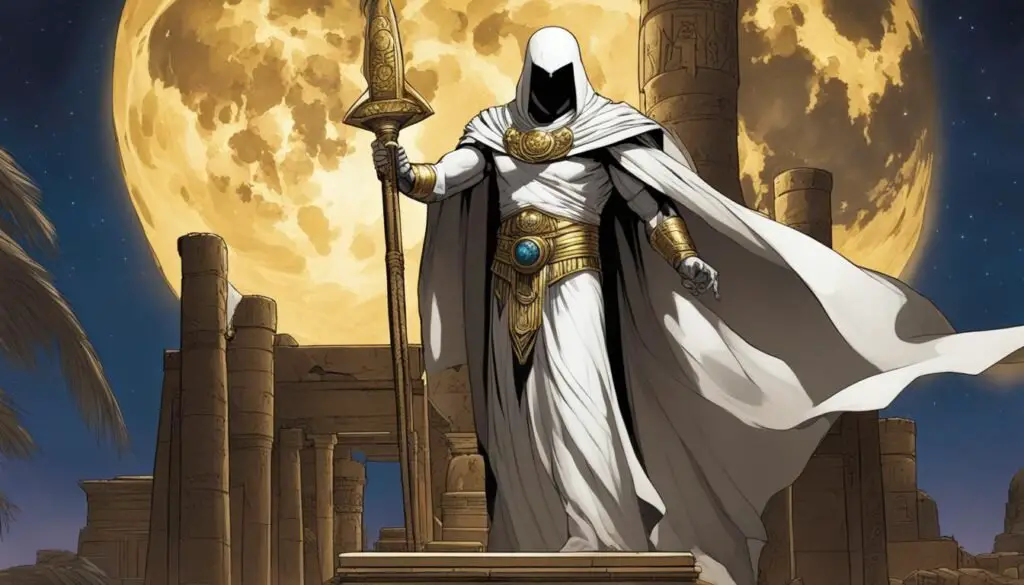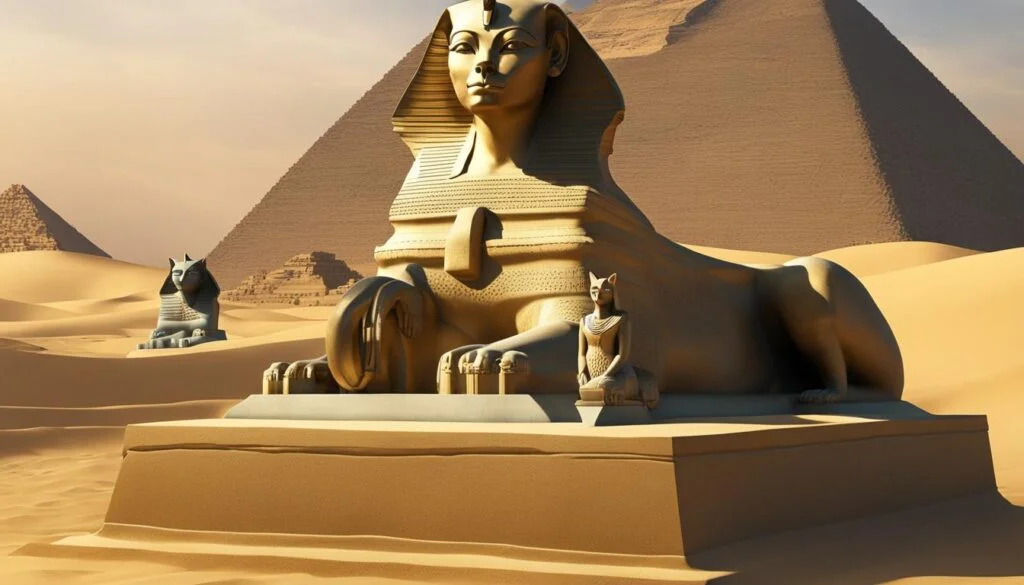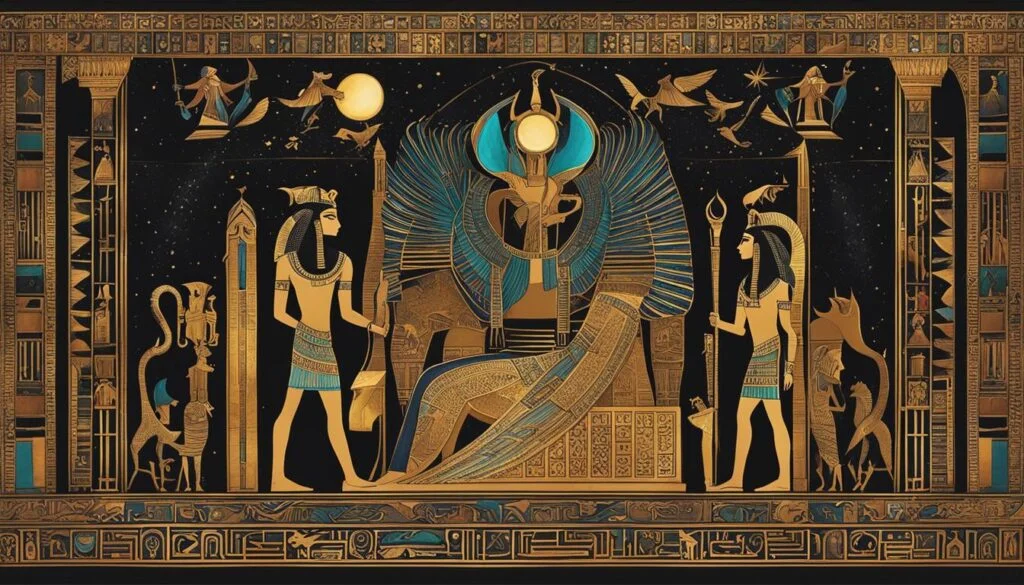Moon Knight, the Disney+ series, explores the mystical side of the Marvel Cinematic Universe (MCU) by introducing several Egyptian gods into the narrative. This expansion of Egyptian mythology adds depth to the enigmatic superhero’s story and sheds light on the ancient pantheon’s connection to Moon Knight.
Key Takeaways:
- Moon Knight’s mythology in the MCU involves the existence of seven Egyptian gods.
- Khonshu, the god of the moon, plays a significant role in Moon Knight’s powers and overall story.
- Ammit, the underworld deity, serves as one of Moon Knight’s antagonists in the series.
- Tefnut and Horus, gods of rain and the sky respectively, expand the ancient Egyptian mythology within the MCU.
- Isis and Osiris, goddess of the moon and god of the dead, contribute to the complexities of Moon Knight’s story.
Khonshu – The Egyptian God of the Moon
Khonshu, the Egyptian god of the moon, plays a central role in the mythology of Moon Knight. Throughout history, Khonshu has chosen individuals to serve as his champions, bestowing upon them superhuman abilities through a unique “healing armor.” This deity has a complicated relationship with Marc Spector, the man behind the Moon Knight persona. While Khonshu granted him powers and brought him back to life, their differing views on vengeance and personal goals often spark tension between them.
In Marvel Comics and the MCU, Khonshu is depicted as the supernatural entity responsible for transforming Marc Spector into Moon Knight. This connection to Khonshu gives Moon Knight his distinct abilities and serves as the foundation for his intriguing story. It is through the powers bestowed by Khonshu that Moon Knight navigates the shadows, fights crime, and battles his inner demons.
Moon Knight’s connection to Khonshu runs deep, shaping both his powers and the conflicts he faces in his heroic journey.
Ammit – The Underworld Deity
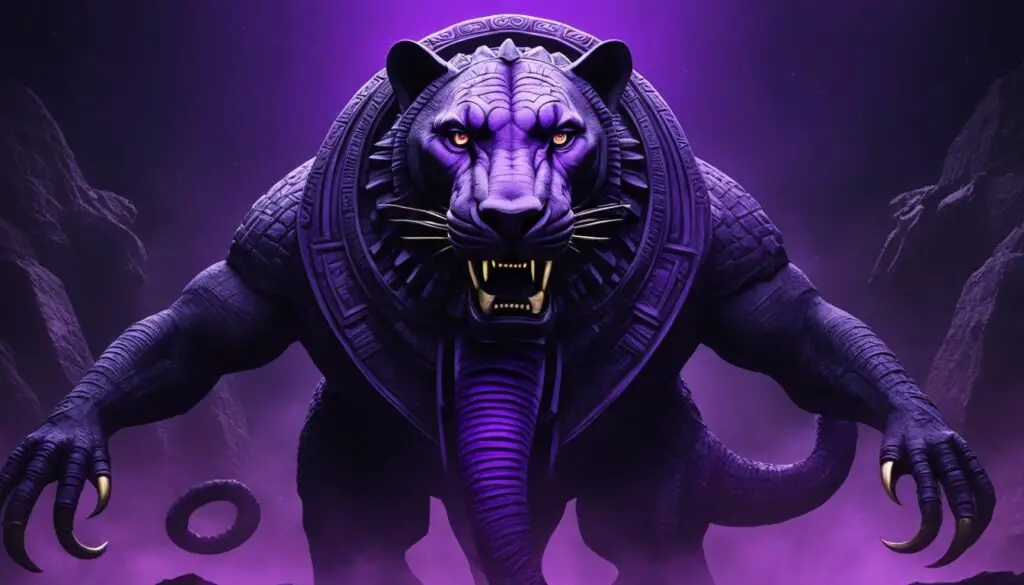
Ammit, portrayed as a crocodile-like creature in Egyptian mythology, is a deity from the underworld feared rather than worshipped. In the Moon Knight series, Ammit is reimagined as a goddess and serves as one of Moon Knight’s adversaries. Her ultimate goal is to bring death to all evildoers before they can commit their crimes. However, she is currently locked in a tomb and relies on Arthur Harrow to grant her freedom. Ammit possesses powerful dark magic, which makes her a formidable force. Her conflict with Moon Knight adds an intriguing dynamic to the series.
Ammit’s Goals in the Moon Knight Series
Ammit’s primary objective in the Moon Knight series is to eliminate evil individuals before they can carry out their nefarious deeds. Unlike other gods, she does not seek worship or adoration but instead focuses on maintaining justice and balance in the world. By harnessing her dark magic, Ammit aims to tip the scales in favor of righteousness by delivering swift punishment to wrongdoers.
Connection Between Moon Knight and Ammit
Moon Knight finds himself entangled with Ammit due to his unwavering dedication to fighting crime and protecting innocent lives. The conflict arises as Moon Knight’s methods often clash with Ammit’s desire for preemptive justice. While Moon Knight believes in rehabilitation and the justice system, Ammit takes a more radical approach, seeking to eradicate evil before it manifests. This clash of ideologies adds depth and tension to their relationship, further highlighting the complexities of Moon Knight’s role as a vigilante.
Moon Knight’s Adversaries
Ammit stands as one of several formidable adversaries Moon Knight encounters throughout his journey. These adversaries test Moon Knight’s determination, resilience, and moral compass. Each encounter presents a unique challenge, forcing Moon Knight to confront his own beliefs and question the boundaries of justice. Ammit’s presence in the series heightens the stakes and provides a compelling opposing force for Moon Knight to face.
Tefnut – The Goddess of Rain
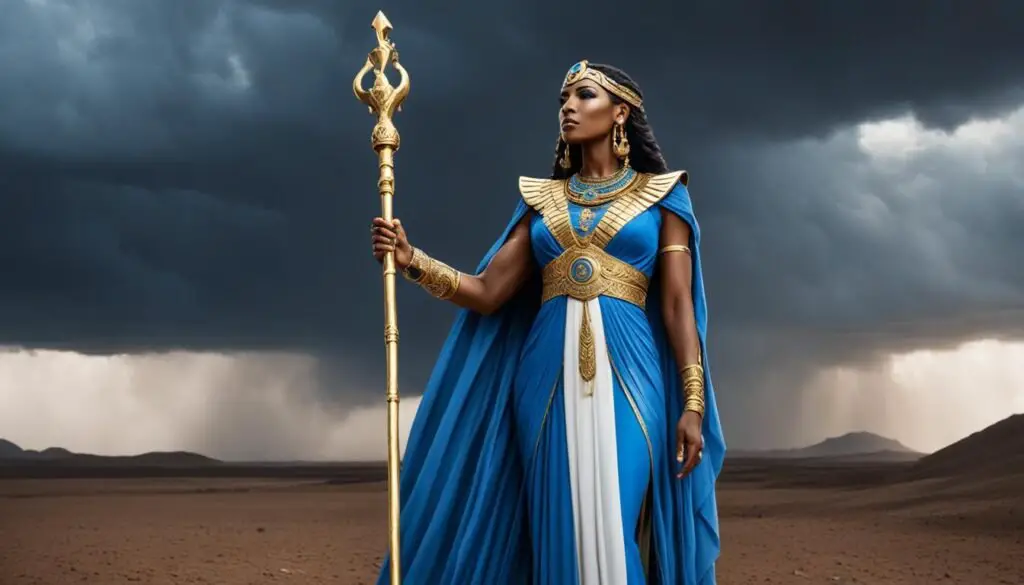
Tefnut, the goddess of rain in Egyptian mythology, plays a significant role in the Moon Knight series, adding depth to the enigmatic superhero’s story. As a member of the Ennead, a group of nine Egyptian deities, Tefnut makes an appearance alongside other gods from the Egyptian pantheon in the series.
Although her twin brother Shu does not appear in the Moon Knight series, Tefnut’s presence suggests his existence as a real being in the Marvel Cinematic Universe (MCU). This inclusion of Tefnut and the possibility of Shu expands the mythology of the MCU and offers new avenues for storytelling and exploration.
In Marvel comics, Tefnut and Shu have not played significant roles in the overarching stories. However, their presence in the Moon Knight series presents an opportunity to delve deeper into their characters and their contributions to the Egyptian pantheon.
Through the portrayal of Tefnut, the Moon Knight series showcases the richness and diversity of Egyptian mythology, giving fans a chance to explore the fascinating world of ancient gods and their significance in the superhero’s narrative.
Goddesses of the Ennead:
- Tefnut – The goddess of rain.
- Isis – The goddess of the moon and fertility.
- Hathor – The goddess of beauty, love, and joy.
These powerful goddesses bring their unique attributes and mythologies to the Moon Knight series, adding depth and intrigue to the narrative. Stay tuned to see how Tefnut’s role unfolds and influences the story of Moon Knight and the Egyptian gods.
Horus – The God of the Sky
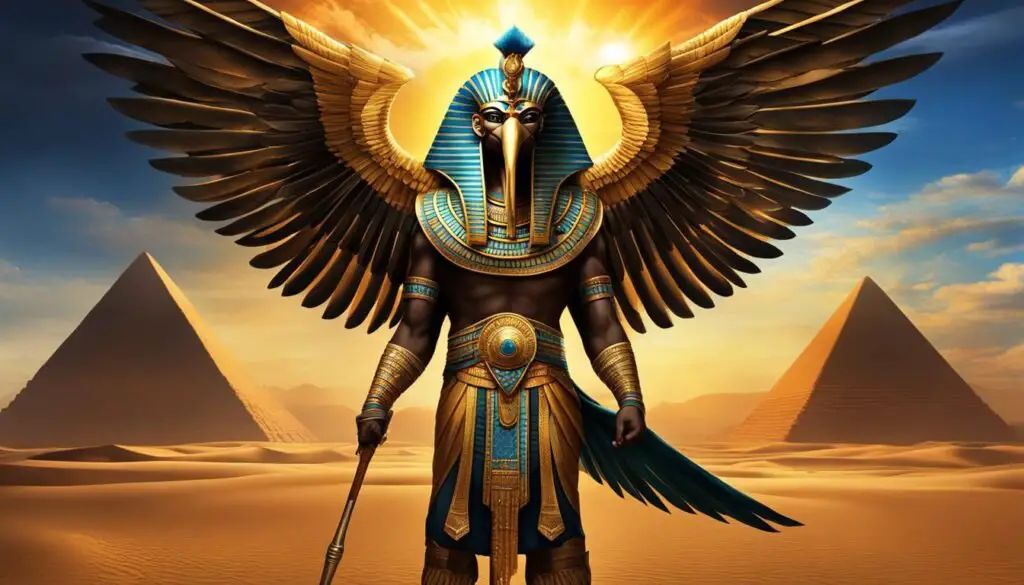
In the world of Egyptian mythology, Horus holds great significance as the god of the sky. This prominent deity is also a crucial part of Moon Knight’s story. In the Moon Knight series, Horus is depicted through an avatar who claims that humanity has abandoned the gods. This portrayal adds depth to the ancient Egyptian mythology and highlights the conflicts between the gods.
Throughout Marvel Comics, Horus has made frequent appearances whenever the Egyptian gods face formidable adversaries. In these stories, Horus often steps in to protect his fellow deities from powerful forces. Ancient history tells us that Horus rose to power by overthrowing Seth, creating a longstanding rivalry between the two.
The inclusion of Horus in the Moon Knight series expands the intricate web of Egyptian mythology surrounding the enigmatic superhero. With his role as the god of the sky, Horus adds an element of majesty and power to the narrative. His presence not only enriches the character of Moon Knight but also showcases the complexities and conflicts inherent in the pantheon of ancient Egyptian gods.
Isis – The Goddess of the Moon and Fertility
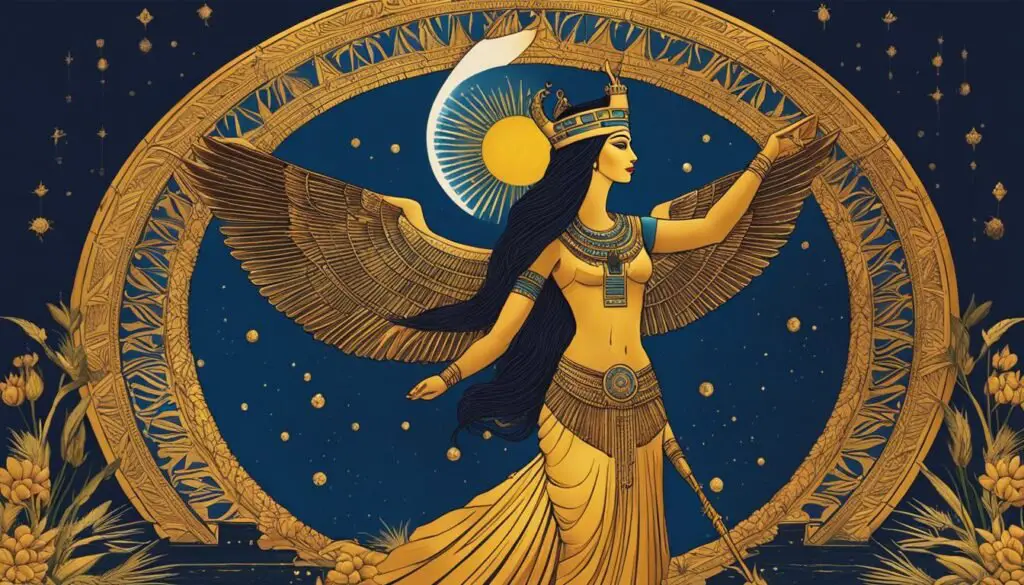
In Egyptian mythology, Isis is one of the most well-known deities in the Egyptian pantheon. She is the mother of Horus, the wife and sister of Osiris, and a prominent symbol of the moon and fertility. According to ancient legends, Isis famously resurrected her dead husband, Osiris, to conceive their son, Horus.
The relationship between Isis and Horus is a central aspect of Egyptian mythology. As the mother of Horus, Isis plays a crucial role in his upbringing and guides him in his quest to avenge his father’s death. Their bond is a testament to the power of maternal love and the resilience of the human spirit.
In the Moon Knight series, the human avatar of Isis is briefly mentioned and contributes to the meeting of the Egyptian gods. While her role may be minimal in the series, her inclusion adds depth to the mythology surrounding Moon Knight and his connections to the Egyptian gods.
The portrayal of Isis in the Moon Knight series further enriches the narrative by showcasing her significance in the Egyptian pantheon. As the Goddess of the Moon and Fertility, she represents the powers of femininity, nurturing, and rebirth. Additionally, Isis is revered as a protector and healer, emphasizing her role as a guiding force in Moon Knight’s story.
While the Moon Knight series primarily focuses on the character’s connection with Khonshu, the inclusion of Isis highlights the broader scope of Egyptian mythology within the Marvel Cinematic Universe. By incorporating these ancient deities, the series explores the intricate relationships between the gods and their influence on the mortal realm.
Osiris – The God of the Dead and Fertility
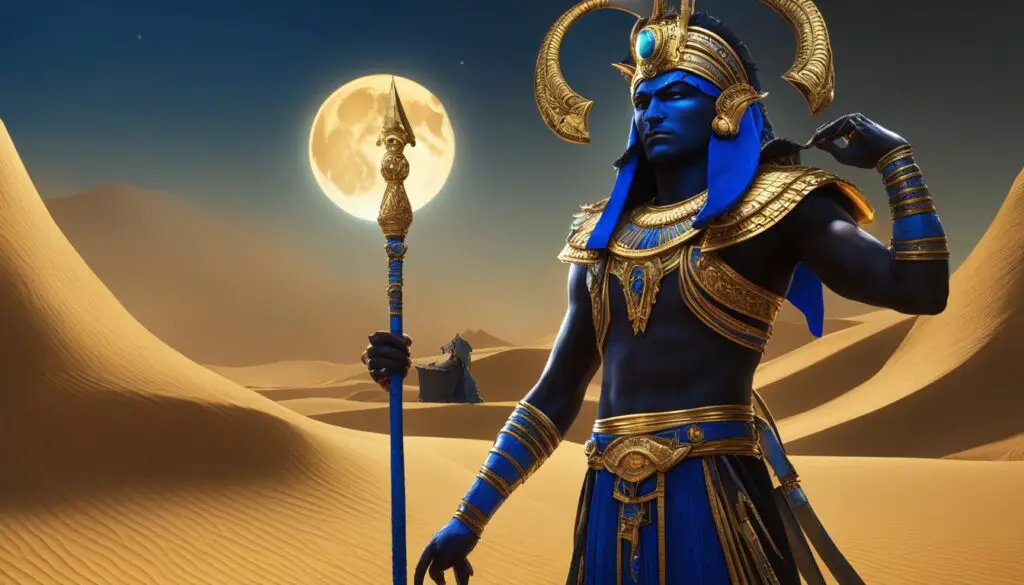
Osiris, the god of the dead and fertility, holds a prominent place in Egyptian mythology and has made his presence felt in the Moon Knight series. In ancient Egyptian lore, Osiris was murdered by his evil brother Seth but was later resurrected by his devoted wife Isis. Marvel Comics adapted a similar narrative, with Osiris, Isis, and their son Horus being sealed away by Seth and later freed by the mighty Thor.
In the Moon Knight series, Osiris stands as one of the Egyptian gods who openly opposes Khonshu, the god of the moon, and expresses skepticism towards Arthur Harrow. Osiris plays a vital role in highlighting the tensions and conflicts among the gods of ancient Egypt. His doubts and criticism of Khonshu’s claims about Arthur Harrow add depth and intrigue to the series, keeping the audience guessing about the true nature of these characters.
Through his representation as the god of the dead and fertility, Osiris brings a sense of mystique and foreboding to the Moon Knight series. His complex history and his role as a rival to Khonshu demonstrate the intricate dynamics within the Egyptian pantheon and open up exciting possibilities for future plot developments.
Conclusion
The Moon Knight series has delved deep into the Egyptian gods and their rich mythology, bringing a mystical twist to the Marvel Cinematic Universe. By introducing gods such as Khonshu, Ammit, Tefnut, Horus, Isis, Osiris, and Hathor, the series has expanded Moon Knight’s mythology and explored the intricate connections between him and the ancient Egyptian deities. This inclusion of gods from Egyptian mythology has added depth, intrigue, and a unique flavor to the story of Moon Knight, making it a captivating addition to the MCU.
Moon Knight’s connection to these Egyptian gods has not only provided a fascinating narrative, but it has also had a significant impact on the series as a whole. The complex relationships between Moon Knight and the gods have given rise to internal conflicts, driving the storyline forward. The ancient Egyptian mythology enhances the character’s powers, backstory, and motivations, making for an engaging and immersive viewing experience for Marvel fans.
The fusion of Egyptian mythology and the superhero genre in the Moon Knight series showcases the potential for creative storytelling within the MCU. By drawing inspiration from ancient cultures and their pantheons of gods, Marvel continues to push the boundaries of its superhero narratives. The inclusion of these Egyptian gods not only expands the mythology of the MCU but also widens the scope for future storytelling possibilities in the ever-expanding Marvel Universe. As Moon Knight establishes his place among the pantheon of Marvel heroes, his connection to the Egyptian gods sets him apart and adds an extra layer of fascination to his character.
FAQ
What is Moon Knight’s connection to the Egyptian gods?
In the Moon Knight series, the character of Moon Knight is closely connected to the Egyptian gods. Specifically, Moon Knight’s powers and origins are tied to the Egyptian god Khonshu, who serves as his patron deity.
Which Egyptian god is Moon Knight?
Moon Knight is primarily associated with Khonshu, the Egyptian god of the moon. Khonshu has chosen individuals throughout history to serve as Moon Knight’s champions and has granted them superhuman abilities through a “healing armor.”
How does Khonshu influence Moon Knight’s powers?
Khonshu grants Moon Knight enhanced strength, agility, and durability. Additionally, Moon Knight gains increased abilities during the nighttime due to his connection with the moon, which is also associated with Khonshu.
Who is Ammit in the Moon Knight series?
In the Moon Knight series, Ammit is reimagined as a goddess and serves as one of Moon Knight’s adversaries. Ammit’s ultimate goal is to bring death to evildoers before they can commit their crimes, and she possesses powerful dark magic.
What is Tefnut’s role in the Moon Knight series?
Tefnut, the goddess of rain in Egyptian mythology, makes an appearance in the Moon Knight series alongside other gods from the Egyptian pantheon. Tefnut’s inclusion expands the mythology of the MCU and adds depth to Moon Knight’s story.
How does Horus contribute to Moon Knight’s mythology?
Horus, a major deity in Egyptian mythology and the god of the sky, is represented in the Moon Knight series by an avatar. Horus’ presence adds depth to the ancient Egyptian mythology and showcases the conflicts between the gods.
What is Isis’ role in the Moon Knight series?
Isis, known as one of the most well-known deities in the Egyptian pantheon, is briefly mentioned in the Moon Knight series and plays a part in the meeting of the Egyptian gods. Her inclusion adds depth to Moon Knight’s mythology and connections to the Egyptian gods.
How does Osiris interact with Moon Knight in the series?
Osiris, the god of the dead and fertility, is depicted in the Moon Knight series as one of the Egyptian gods who opposes Khonshu and is skeptical of Arthur Harrow. Osiris voices his criticism of Khonshu and dismisses his claims about Arthur Harrow.
What impact does the mythology of the Egyptian gods have on Moon Knight’s story?
The inclusion of the Egyptian gods in the Moon Knight series adds depth and intrigue to Moon Knight’s story. The connections between the gods and the enigmatic superhero provide a unique and captivating aspect to the series, expanding the mystical side of the Marvel Cinematic Universe.


